Nothin' says it quite like the Bible (even that "newfangled testament" part everybody's talking about these days). I came across this passage in preparing a lesson for 4th grade Religion class. I must admit it sounds much stonger in the Good News Bible/Contemporary English Version:
Jude 1:3-16
3My dear friends, I really wanted to write you about God's saving power at work in our lives. But instead, I must write and ask you to defend the faith that God has once for all given to his people. 4Some godless people have sneaked in among us and are saying, "God treats us much better than we deserve, and so it is all right to be immoral." They even deny that we must obey Jesus Christ as our only Master and Lord. But long ago the Scriptures warned that these godless people were doomed. 5Don't forget what happened to those people that the Lord rescued from Egypt. Some of them did not have faith, and he later destroyed them. 6You also know about the angels who didn't do their work and left their proper places. God chained them with everlasting chains and is now keeping them in dark pits until the great day of judgment. 7We should also be warned by what happened to the cities of Sodom and Gomorrah and the nearby towns. Their people became immoral and did all sorts of sexual sins. Then God made an example of them and punished them with eternal fire. 8The people I am talking about are behaving just like those dreamers who destroyed their own bodies. They reject all authority and insult angels. 9Even Michael, the chief angel, didn't dare to insult the devil, when the two of them were arguing about the body of Moses. All Michael said was, "The Lord will punish you!" 10But these people insult powers they don't know anything about. They are like senseless animals that end up getting destroyed, because they live only by their feelings. 11Now they are in for real trouble. They have followed Cain's example and have made the same mistake that Balaam did by caring only for money. They have also rebelled against God, just as Korah did. Because of all this, they will be destroyed. 12These people are filthy minded, and by their shameful and selfish actions they spoil the meals you eat together. They are like clouds blown along by the wind, but never bringing any rain. They are like leafless trees, uprooted and dead, and unable to produce fruit. 13Their shameful deeds show up like foam on wild ocean waves. They are like wandering stars forever doomed to the darkest pits of hell. 14Enoch was the seventh person after Adam, and he was talking about these people when he said: Look! The Lord is coming with thousands and thousands of holy angels 15to judge everyone. He will punish all those ungodly people for all the evil things they have done. The Lord will surely punish those ungodly sinners for every evil thing they have ever said about him. 16These people grumble and complain and live by their own selfish desires. They brag about themselves and flatter others to get what they want.
Tuesday, January 31, 2006
Monday, January 30, 2006
Remember
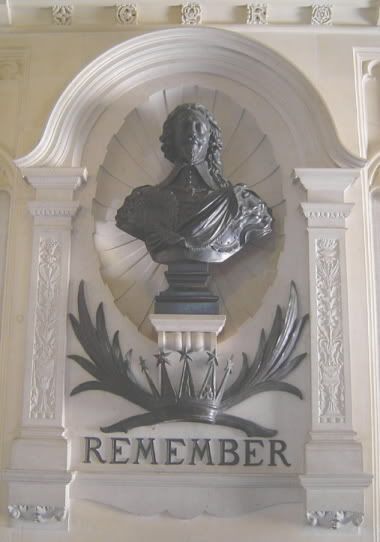
Today is the commemoration of the martyrdom of Charles I, the last English sovereign venerated as a saint. Charles fostered the beginnings of a revival in Anglicanism. Following the policies of Archbishop William Laud, the Holy Communion was once again seen as the principal action of the Church rather than the sermon, and the doctrine of the Real Presence at the Communion was once again taught in the universities. Vestments began to be worn again and altars were restored in churches, repairing much of the iconoclasm of the Reformation era. Candles were lit once more and a greater emphasis was placed on worship and Church music.
Theologians of the era (the "Caroline Divines") left a rich legacy of spiritual writings such as the sermons of Lancelot Andrewes and The Country Parson by George Herbert. Religious Community life was re-established by Nicholas Ferrar at Little Gidding, later immortalised by T.S. Eliot. Their influence sustained the Church through the dark days of the Commonwealth and were recognised in later generations as a ‘golden age’ of Anglicanism. All of this was supported and fostered by Charles himself, whose own personal piety was widely remarked on in his own time.
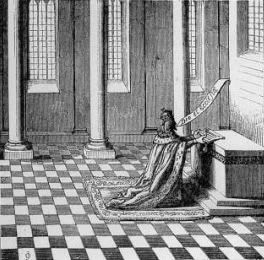
S. Charles, King and Martyr, protector of the Church's privileges
With the loss of the Civil War and the execution of Laud, Charles was left as a prisoner of the parliamentarian and puritan cause. It is now widely recognised that he was offered his life and his throne if he would renounce episcopacy and the Prayer Book and embrace Presbyterianism. Charles understood himself to have a clear duty to the Church of Enlgand as its supreme governor to protect the integrity of its Catholic order. Since he refused to turn it into a calvinist protestant sect, he found himself facing execution. To embrace the crown of life, he laid aside the royal crown and accepted his own crown of thorns. In imitation of our Lord, Charles publicly forgave and prayed for his persecutors. His last word was, "Remember." Charles was beheaded by Oliver Cromwell's government on 30th of January 1649. Anglican loyalists present came forward to dip their hankerchiefs in his blood to preserve relics by which they would remember his last measure of devotion.
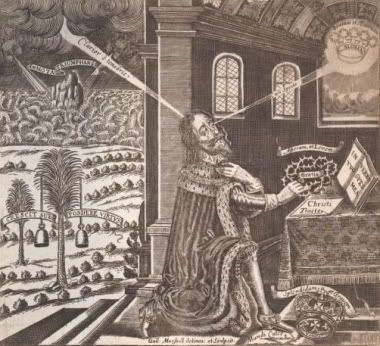
Updates: Some very good resources for further reading about King Charles the Martyr can be found on this page at Project Canterbury. Also, Bishop Jack Iker gave the sermon for the 2006 Annual Meeting of the Society of King Charles the Martyr (USA). He remarked:
In these days of conflict and controversy in the Anglican Communion, which might well be described as a civil war, we do well to remember the example of Charles, King and martyr. For there are many who would urge us to compromise and give in to those who would redefine and reinterpret catholic faith and order, who call the changes they propose "progress"–-and urge us to go along in order to keep the peace. We too are urged to go along in order to get along. But we will not-–and we cannot-–for we believe that the historic faith and practice of the catholic church, which we profess, are God-given, Spirit formed and molded and essential to the apostolic tradition and teaching that we are sworn to uphold and to pass on to the next generation, as we have received them. . . . Remember. Remember there are things worth dying for-–our faith in God is chief among them. Many have done so before us (as Charles did), and many shall do so after us. For "the blood of the martyrs is the seed of the Church." (Tertullian).
Read the whole text of his homily here.
Monday, January 23, 2006
What do Anglicans believe? Part 5
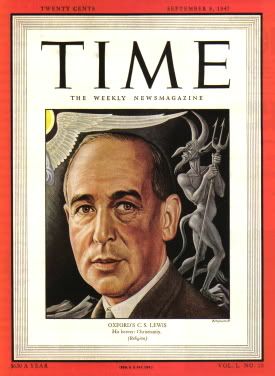
Clive Staples "Jack" Lewis. When Time featured his portrait in 1947, the secular world sat up and took notice of this Oxford scholar's soaring popularity on both sides of the Atlantic. The cover story, entitled "Don vs. Devil," listed Lewis among a growing group of "heretics"--intellectuals who believe in God--along with T.S. Eliot, W.H. Auden, Dorothy Sayers, and Graham Greene.
Lewis taught as a fellow of Magdalen College, Oxford, for nearly thirty years, from 1925 to 1954, and later was the first Professor of Medieval and Renaissance Literature at the University of Cambridge. He continues to be known best as the author of the Chronicles of Narnia and for his work as a lay apologist in the Church of England. This quote from Mere Christianity captures his no-nonsense approach to the faith:
"I am trying here to prevent anyone from saying the really foolish thing that people often say about him: ‘I am ready to accept Jesus as a great moral teacher, but I don’t accept his claim to be God.’ That is one thing we must not say. A man who was merely a man and said the sort of things Jesus said would not be a great moral teacher. He would be either a lunatic—on a level with the man who says he is a poached egg—or else he would be the devil of hell. You must make your choice. Either this man was, and is, the Son of God: or else a madman or something worse. . . . You can shut him up for a fool, you can spit at him and kill him as a demon; or you can fall at his feet and call him Lord and God. But let us not come up with any patronizing nonsense about his being a great moral teacher. He has not left that open to us. He did not intend to."
Sunday, January 22, 2006
Symptoms of bird flu
I've come down with something over the past few days. I thought the fever was gone, but it lingers on as of Sunday evening. I thought about, what if it is a case of the dreaded "bird flu"? What are the symptoms to watch for? In the interest of public health, let me share my findings from webMD.
Symptoms of bird flu:
1. a stinging rash followed by the appearance of feathers
2. loss of normal appetite coupled with sudden cravings for worms and seeds
3. doing you-know-what on the hood of your car
4. a tendency to head South
5. sitting on power lines
Symptoms of bird flu:
1. a stinging rash followed by the appearance of feathers
2. loss of normal appetite coupled with sudden cravings for worms and seeds
3. doing you-know-what on the hood of your car
4. a tendency to head South
5. sitting on power lines
Friday, January 20, 2006
Things you can do with a Master of Divinity
With an M.Div., you can now:
1. Ascertain whether a person has an appropriate affect
2. Keep looking for the Gospel of Mark at the beginning of the New Testament in your Bible
3. Find underground water
1. Ascertain whether a person has an appropriate affect
2. Keep looking for the Gospel of Mark at the beginning of the New Testament in your Bible
3. Find underground water
Monday, January 16, 2006
What do Anglicans believe? Part 4
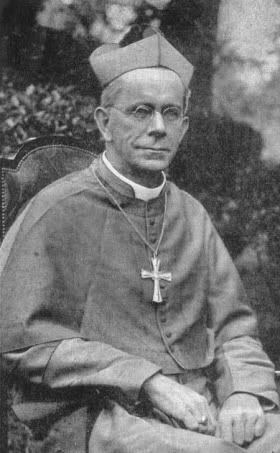
The Rt Rev'd Frank Weston, Lord Bishop of Zanzibar
Sidney Dark wrote a forward to Weston's speech "Our Present Duty" in which he noted: "I think it would be safe to say that the speech with which the late Bishop of Zanzibar concluded the Anglo-Catholic Congress in 1923 was the most eloquent, the most moving, and the most exalted religious message delivered in London by a highly placed ecclesiastic in this generation. Dr. Frank Weston was a man of many great parts. In scholarship he had few equals among his episcopal brethren. He was a man of great force of character, certain to dominate any assembly of which he was a member. This was shown at the Lambeth Conference in 1921 when, as the late Dr. Watts-Ditchfield so generously admitted, he was one of the three or four bishops whose direct personal influence affected the assembly. His power over his fellows was due to a rare combination of character and intellect. We who were present at the Albert Hall on those blazing hot days in the Summer of 1923 had our own experience of the magnetic power of Dr. Weston’s personality."
On that occasion, Weston said, "I want you to make your stand for the Tabernacle, not for your own sakes but for the sake of truth first, and in the second place for the sake of reunion hereafter. But for the truth, because the one great thing that England needs to learn is that Christ is found in and amid matter—Spirit through matter—God in flesh, God in the Sacrament. But I say to you, and I say it to you with all the earnestness that I have, that if you are prepared to fight for the right of adoring Jesus in his Blessed Sacrament, then you have got to come out from before your Tabernacle and walk, with Christ mystically present in you, out into the streets of this country, and find the same Jesus in the people of your cities and your villages. You cannot claim to worship Jesus in the Tabernacle, if you do not pity Jesus in the slum. . . . I am talking the Gospel, and I say to you this: If you are Christians then your Jesus is one and the same: Jesus on the Throne of his glory, Jesus in the Blessed Sacrament, Jesus received into your hearts in Communion, Jesus with you mystically as you pray, and Jesus enthroned in the hearts and bodies of his brothers and sisters up and down this country. And it is folly—it is madness—to suppose that you can worship Jesus in the Sacraments and Jesus on the Throne of glory, when you are sweating him in the souls and bodies of his children."
Also, in the open leter "Ecclesia Anglicana: For What Does She Stand?" to the Bishop of St Alban's in 1914, Weston wrote: "All this, of course, is quite admirable in spite of the anomalous position of the Bishop, so long as the Ecclesia Anglicana knows her own mind. But if once the Church at the base gets into any difficulties of self-expression, the missionaries at the front are practically giving their lives to a lost cause. . . . For myself I gain no comfort from [these difficulties of self-expression]. A mediating Church, it seems to me, would not include within its borders two men of directly contradictory beliefs: rather it would so modify and adjust the two beliefs until they were seen to be complementary, and then it would help one man to hold them both. . . . The Ecclesia Anglicana claims to be the Catholic Church in England, and to recall her to her true witness requires more than one voice. We cannot shew a united front against Modernism, our most deadly danger, unless we at the same time declare ourselves true to our own position."
Sunday, January 15, 2006
I'm addicted
I have to admit I've become addicted to the amazing storehouse of online information available on all imaginable topics of knowledge. I particularly like Wikipedia and the Love to Know 1911 Ecylopedia Britannica. My only consolation is that it is an intellectual pursuit. Leave a comment if there is another site you think I would like to visit.
It just doesn't seem right
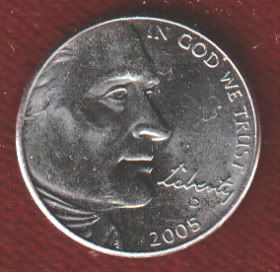
The face of a new "nickel."
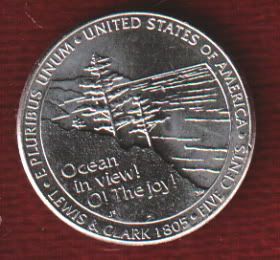
The back of the new "nickel," featuring Lewis and Clark's version of "Monticello."
I once had a dream that I kept getting counterfeit change while I was out shopping. And I mean really counterfeit--like $23 bills printed on one side with a color portrait of Art Linkletter. Now it seems like my nightmare is starting to come true. This has to be one of the signs of the apocalypse. Perhaps you too have noticed new paper money with funny looking big heads off to one side and splashes of color here and there (not to mention GPS magnetic tracking fibers embedded in the bill so "big brother" can keep tabs on you at all times--to send a black helicopter to "rescue" you if you become "unsafe").
Now it has happened to our coins. The commemorative quarters didn't bother me so much. We've had those before, and they only changed the back anyway. Imagine my surprise when I pulled this "nickel" out of my pocket after stopping by the convenience store on my way home the other day. More big heads! And cursive! Cursive on American money! No wonder Europe doesn't respect us anymore. When I looked on the back it was even worse; there was no Monticello. The coin was like something that had been thrown off a float in a Mardi Gras parade.
After giving it some thought, I believe I have arrived at a solution. I know you are fed up with this too. So I say, gather up all that funny "money"--both those new dabloons and all those colorful Federal Reserve notes--and send them to me. I'll keep them safely out of sight.
Wednesday, January 11, 2006
What do Anglicans believe? Part 3
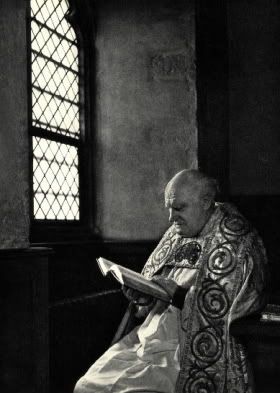
The Most Rev'd and Rt Hon Lord Arthur Michael Ramsey,
100th Archbishop of Canterbury
Here is an excerpt from the classic book by Dr. Ramsey, of recent memory, called The Gospel and the Catholic Church [pp 65-67].
The study of the historical death and resurrection of Jesus has led us to the study of the Apostolic Church, and thence, in one organic movement, to the study of "Catholicism." The impact of the Gospel has led on to the structure of the Church. What, then, is the relation between the Gospel and "Catholicism ?" It seems impossible to understand them separately. For we cannot appeal back to the authority of Jesus Christ without being led to face the Church and its outward marks. To know Jesus we must pass beyond His life and example to His death and resurrection, and these events were intelligible only through the scriptures which foretold them and through the Apostles who shared in them when they died with Christ and were raised together with Him. This dying and rising means the one Body; we know Christ through dying in its one life, and the marks of the Church help us to die by pointing us to the universal family whose membership is death and life in Christ.
In short, the only appeal back to Jesus which is logically and spiritually coherent is an appeal to the Gospel of God uttered in the one Body by its whole structure. However much it may have suffered perversion in history, this structure proclaims the Gospel by pointing men beyond this or that experience, this or that achievement, this or that movement or revival, to the universal society in which all these are made full. If we would draw near to the naked facts of Calvary and Easter, we can do so only in the one fellowship whose very meaning is death to self.
The Catholicism, therefore, which sprang from the Gospel of God is a faith wherein the visible and ordered Church fills an important place. But this Church is understood less as an institution founded upon the rules laid down by Christ and the Apostles than as an organism which grew inevitably through Christ's death and resurrection. The Church, therefore, is defined not in terms of itself, but in terms of Christ, whose Gospel created it and whose life is its indwelling life.
But the Church's order does not imply that those who possess it are always more godly than those who are without it. For it does not bear witness to the perfection of those who share in it, but to the Gospel of God by which alone, in one universal family, mankind can be made perfect. It is not something Roman or Greek or Anglican; rather does it declare to men their utter dependence upon Christ by setting forth the universal Church in which all that is Anglican or Roman or Greek or partial or local in any way must share by an agonizing death to its pride.
Many fruits of the Spirit will be found apart from the full Church order; yet those fruits and all others will grow to perfection only through the growth of the one Body in which Christ is all in all fulfilled, and it is the Church order that in every age bears witness to this one Body of which every movement, experience, "ism," achievement, must know itself to be a fragmentary part.
To assert that Church order is thus related to the Gospel is unpopular in many modern theological circles. It is widely assumed that a deeper understanding of that Gospel brings an indifference to Church order. But Baptism and Episcopacy are part of the utterance of God’s redemptive love, and they proclaim that men’s love is made perfect only by the building up of the one Body in which alone, by the due working of all its parts, the truth that is in Jesus is fully learnt.
The proof you seek
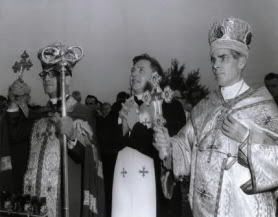
This post is for my friend, Fr David Madison at All Saints.' He gave a wonderful presentation recently on Bishop Fulton Sheen. I mentioned that Bishop Sheen was actually bi-ritual (a fact of which no one else in the room seemed to be aware), and this photo shows him in the context of an Eastern-rite Liturgy.
Normally, Catholic priests and bishops may only celebrate according to the rite in which they were ordained. If they participate in other rites, they should wear the vesture of their own. However, a few priests and bishops have a special dispensation to "belong" to more than one rite, usually to minister to a small liturgical community that needs have someone with a shared ministry.
Tuesday, January 10, 2006
I remember my first sermon
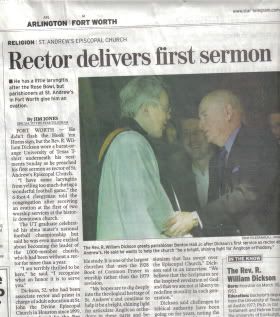
I thought this was an amusing headline in the local newspaper. Nevertheless, Timotheos sends his sincere congratulations to the people of St Andrew's, Fort Worth and well wishes to Dr. Dickson for a long and happy ministry here in the diocese.
Saturday, January 07, 2006
Caught in the lion's den

I suppose most Episcopal priest bloggers will be expected to post comments on the Book of Daniel, so here goes my two cents.
In the past few years, there has been a lot of talk about how the public has a renewed interested in entertainment which thoughtfully engages religious issues. After watching Jack Kenny's Book of Daniel, you have to question the intelligence of those who think this is the way to cash in on the Passion of the Christ and Narnia crowd. After all, how much sin can you squeeze into one little episode? In the early minutes of the program, the Bishop (played by Ellen Burstyn) asking Father Daniel (played by Aidan Quinn) about his sermon's advice on indulging in temptation, says something along the lines of: "With a church that's in crisis, is it wise to be doing this?" I think that captures my review.
Going in, I was already aware of some of the negative things to expect (the drug abuse and the sexual immorality in the family), but there were a few things that did take me by surprise:
1. The prayer life of Daniel (i.e., the Jesus segments) was definitely the best part of the show, and oddly, the most normal. In a crazy life, trying to cope with all its problems, Jesus brought some normalcy and even accountability into the picture. I suppose that's the point the show is trying to make.
2. The two bishops cheating with each other (one fornicating, the other committing adultery) did shock me. I was surprised that got to me after all the nonsense that came before it. I had expected more, even from fictional liberal bishops about whom Jesus says at one point in the episode, "He no longer listens to me."
3. I was shocked by the engaged couple who were fornicating and playing house. Not so much that they were, but that Father Daniel assumes so and condones it. Normally, that would stop marital preparation in its tracks. I guess it did in this case too, since Father Daniel unwittingly convinces them to not get married and just continue as they are instead.
4. Father Daniel gets his local Italian Catholic priest buddy to pull some strings with the mob. What's up with that? Talk about unrealistic and irrational ethnic stereotypes.
5. What I found most surprising was the lack of commercial advertisements throughout the program. I guess the public outcry has been more pronounced than I realized, which is a good sign for Episcopalians (but a bad sign for Jack Kenny, the show's creator). There were several commercial breaks which had NO COMMERCIALS, just NBC promos and even some dead air in places.
I have read quotes from some Episcopal clergy saying this represents a great opportunity for evangelism. I would contend that it is a missed opportunity at best. After all, I don't remember Dan Akroyd's sitcom "Soul Man" about an Episcopal priest, nor M. Night Shamalan's movie Signs which had an Episcopal priest in the lead, flooding our parishes with interested visitors. No others programs which put churches in a more positive light ("Seventh Heaven," "Touched by an Angel," "Highway to Heaven," "Father Dowling Mysteries," "Father Ted," or the "Vicar of Dibley") seem to have done so either.
I suspect it is the old Episcopal idea of evangelism--if our pretty parish building is on TV or in the papers, the awed public will just come flooding in the front door. I don't think so.
Thursday, January 05, 2006
What do Anglicans believe? Part 2
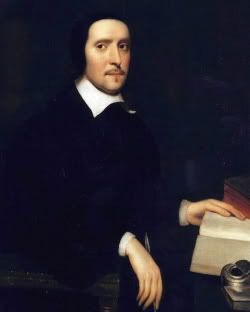
Here is an excerpt from "A Letter to a Gentleman Seduced to the Church of Rome" by Dr. Jeremy Taylor, Bishop of Down and Connor (1661-67).
"What can be supposed wanting [in the Church of England] in order to salvation? We have the Word of God, the Faith of the Apostles, the Creeds of the Primitive Church, the Articles of the four first General Councils, a holy liturgy, excellent prayers, perfect Sacraments, faith and repentance, the Ten Commandments, and the sermons of Christ, and all the precepts and counsels of the Gospel. We teach the necessity of good works, and require and strictly exact the severity of a holy life. We live in obedience to God, and are ready to die for Him, and do so when He requires us so to do. We speak honourably of His most Holy Name. We worship Him at the mention of His Name. We confess His attributes. We love His servants. We pray for all men. We love all Christians, even our most erring brethren. We confess our sins to God and to our brethren whom we have offended, and to God's ministers in cases of scandal or of a troubled conscience. We communicate often. We are enjoined to receive the Holy Sacrament thrice every year at least. Our priests absolve the penitent. Our Bishops ordain priests, and confirm baptized persons, and bless their people and intercede for them. And what could here be wanting to salvation?"
Monday, January 02, 2006
What do Anglicans believe? Part 1
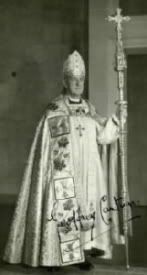
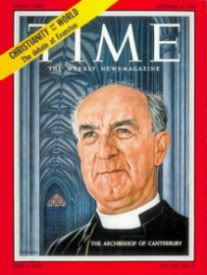
The Most Rev'd and Rt Hon. Lord Geoffrey Fisher, 99th Archbishop of Canterbury
I thought I might begin a series of posts with comments from prominent Anglican sources about our identity in terms of faith and practice. We begin with this popular quote from Dr. Fisher:
"We have no doctrine of our own. We only possess the Catholic doctrine of the Catholic Church, enshrined within the Catholic Creeds--and those Creeds we hold without addition or diminution. We stand firm on that rock."
Here is a further note on the same theme from the 1922 Doctrine Commission of the Church of England:
"There is not, and the majority of us do not desire that there should be, a system of distinctly Anglican Theology. The Anglican Churches have received and hold the faith of Catholic Christendom, but they have exhibited a rich variety in methods both of approach and interpretation. They are heirs of the Reformation as well as of the Catholic tradition; and they hold together in a single fellowship of worship and witness those whose chief attachment is to each of these, and also those whose attitude to the distinctively Christian tradition is most deeply affected by the tradition of a free and liberal culture which is historically the bequest of the Greek spirit."
Subscribe to:
Comments (Atom)

